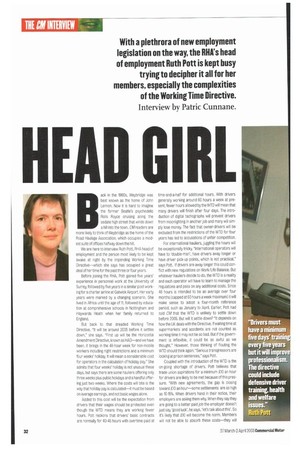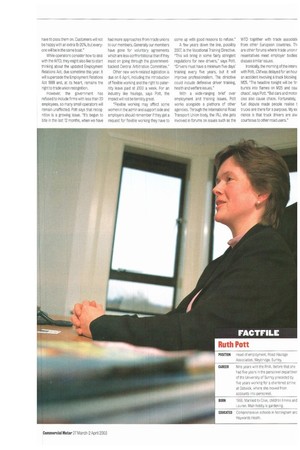Eli
Page 32

Page 33

If you've noticed an error in this article please click here to report it so we can fix it.
With a plethrora of new employment legislation on the way, the RHA's head of employment Ruth Pott is kept busy trying to decipher it all for her members, especially the complexities of the Working Time Directive. Interview by Patric Cunnane.
ack in the 1960s, Weybridge was best known as the home of John Lennon. Now it is hard to imagine the former Beetle's psychedelic Rolls Royce cruising along the sedate high street that winds down a hill into the town. CM readers are more likely to think of Weybridge as the home of the Road Haulage Association, which occupies a modest suite of offices halfway down the hill.
We are here to interview Ruth Pott, AHA head of employment and the person most likely to be kept awake at night by the impending Working Time Directive—which she says has occupied a great deal of her time for the past three or four years.
Before joining the RHA, Pott gained five years' experience in personnel work at the University of Surrey, followed by five years in a similar post working for a charter airline at Gatwick Airport. Her early years were marked by a changing scenario. She lived in Africa until the age of 11, followed by education at comprehensive schools in Nottingham and Haywards Heath when her family returned to England.
But back to that dreaded Working Time Directive, "It will be around 2005 before it settles down," she says. 'First up will be the Horizontal Amendment Directive, known as HAD—and we have been. It brings in the 48-hour week for non-mobile workers including night restrictions and a minimum four weeks' holiday. It will mean a considerable cost for operators in the calculation of holiday pay." She admits that four weeks' holiday is not unusual these days, but says there are some hauliers offering only three weeks plus public holidays and a handful offering just two weeks. Where the costs will bite is the way that holiday pay is calculated—it must be based on average earnings, and not basic wages alone.
Added to this cost will be the expectation from drivers that their wages should be protected even though the WTD means they are working fewer hours. Pott reckons that drivers' basic contracts are normally for 40-45 hours with overtime paid at time-and-a-half for additional hours. With drivers generally working around 60 hours a week at present, fewer hours allowed by the WTD will mean that many drivers will finish after four days. The introduction of digital tachographs will prevent drivers from moonlighting in another job and many will simply lose money. The fact that owner-drivers will be excluded from the restrictions of the WTD for four years has led to accusations of unfair competition.
For international hauliers, juggling the hours will be exceptionally tricky "International operators will have to 'double-man', have drivers away longer or have driver pick-up points, which is not practical." says Pott. If drivers are away longer this could conflict with new regulations on Work/Life Balance. But whatever hauliers decide to do, the WTD is a reality and each operator will have to learn to manage the regulations and pass on any additional costs. Since 48 hours is intended to be an average over four months (capped at 60 hours a week maximum) it will make sense to adopt a four-month reference period, such as January to April. Earlier, Pott had told CM that the WTD is unlikely to settle down before 2005. But will it settle down? "It depends on how the UK deals with the Directive. If waiting time at supermarkets and accidents are not counted as working time it may not be so bad. But if the government is inflexible, it could be as awful as we thought." However, those thinking of flouting the WTD should think again: "Serious transgressors are looking at prison sentences," says Pott.
Coupled with the introduction of the WTD is the on-going shortage of drivers. Pott believes that trade union aspirations for a minimum £10 an hour for drivers are likely to be met because of this pressure. "With new agreements, the gap is closing toward £10 an hour—some settlements are as high as 10-15%. When drivers hand in their notice, their employers are asking them why. When they say they are going to a better paid job the employer doesn't just say, 'good luck', he says, 'let's talk about this'. So it's likely that £10 will become the norm. Members will not be able to absorb these costs—they will have to pass them on. Customers will not be happy with an extra 15-20%, but everyone will be in the same boat."
While operators consider how to deal with the WTD, they might also like to start thinking about the updated Employment Relations Act, due sometime this year. It will supercede the Employment Relations Act 1999 and, at its heart, remains the right to trade union recognition.
However, the government has refused to include firms with less than 20 employees, so many small operators will remain unaffected, Pott says that recognition is a growing issue. "It's begun to bite in the last 12 months, when we have had more approaches from trade unions to our members. Generally our members have gone for voluntary agreements which are less confrontational than if they insist on going through the governmentbacked Central Arbitration Committee."
Other new work-related legislation is due on 6 April, including the introduction of flexible working and the right to paternity leave paid at .£100 a week. For an industry like haulage, says Pott, the impact will not be terribly great.
"Flexible working may affect some women in the acfmin and support side and employers should remember if they get a request for flexible working they have to come up with good reasons to refuse."
A few years down the line, possibly 2007, is the Vocational Training Directive. "This will bring in some fairly stringent regulations for new drivers," says Pott. "Drivers must have a minimum five days' training every five years, but it will improve professionalism. The directive could include defensive driver training. health and welfare issues."
With a wide-ranging brief over employment and training issues, Pott works alongside a plethora of other agencies. Through the International Road Transport Union body, the IRU. she gets involved in forums on issues such as the WTD together with trade associatil from other European countries. Th are other forums where trade union r resentatives meet employer bodies discuss similar issues.
Ironically, the morning of the interv with Pott, CM was delayed for an hour an accident involving a truck blocking M25. "The headline tonight will be .tri bursts into flames on M25 and eau chaos', says Pott. "But cars and motor cies also cause chaos. Fortunately, fuel dispute made people realise t trucks are there for a purpose. My ex rience is that truck drivers are alw courteous to other road users."












































































































































































